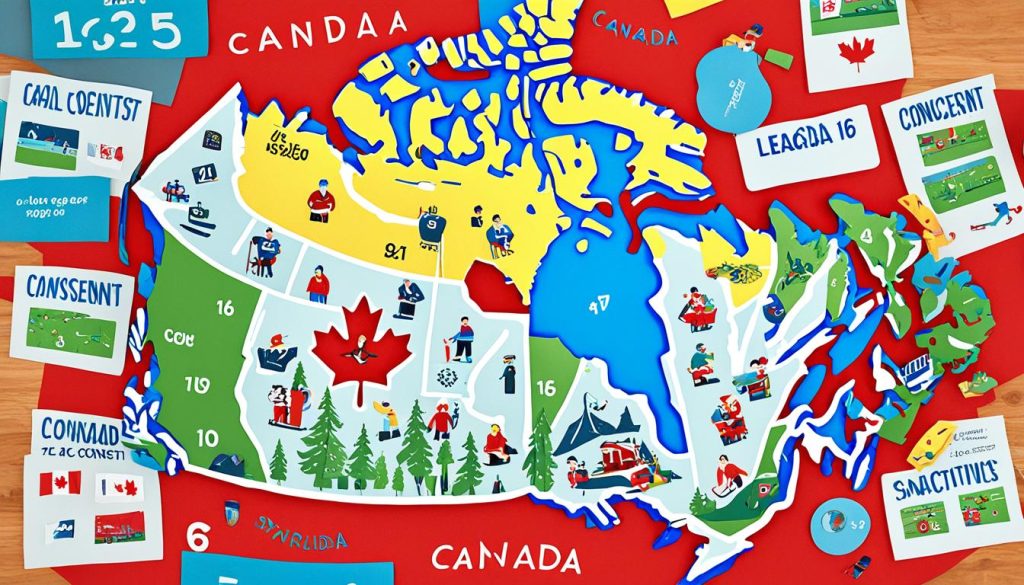As someone living in Canada, it is vital to understand the legal age requirements and restrictions that govern various activities in our country. Whether it’s the age at which you can engage in certain behaviors or the rights and responsibilities you gain as an adult, being informed about legal age in Canada is crucial. In this article, I will discuss the age of consent, the age of majority, and other important legal age restrictions that you should be aware of.
Key Takeaways
- The age of consent in Canada is 16 years old, with exceptions for close-in-age relationships.
- The age of majority in Canada varies by province or territory, ranging from 18 to 19 years old.
- Each jurisdiction in Canada has its own legal age for activities such as drinking, buying cigarettes, and driving.
- It is important to familiarize yourself with the specific laws in your province or territory to understand your rights and responsibilities as a legal adult.
- Child protection laws may differ slightly across provinces and territories, but they are all aimed at safeguarding children from abuse and neglect.
Age of Consent in Canada
In Canada, the age of consent is 16 years old. This means that individuals who are 16 years of age or older are legally able to engage in consensual sexual activity. However, it is important to note that there are certain circumstances where the age of consent may be higher.

These circumstances include situations where there is a relationship of trust, authority, or dependency involved. For example, if one person is in a position of power or authority over the other person, such as a teacher, coach, or family member, the age of consent may be higher.
In addition, there are close-in-age exceptions for young people who are 14 or 15 years old. These exceptions recognize that close-in-age relationships between individuals who are close in age and at a similar stage of development are not the same as relationships involving a significant power imbalance.
It is important to understand that all sexual activity without consent, regardless of age, is a criminal offense in Canada. Consent must be freely given, enthusiastic, and ongoing throughout the sexual activity.
To learn more about the age of consent and sexual activity laws in Canada, it is recommended to consult local legal resources or seek advice from qualified professionals.
Age of Majority in Canada
In Canada, the age of majority marks the transition from childhood to adulthood. It is the age at which an individual is considered a legal adult and assumes the rights and responsibilities that come with adulthood.
The age of majority varies across Canada, with different provinces and territories setting their own age thresholds. In most provinces and territories, the age of majority is 18 years old. However, there are exceptions where the age of majority is 19 years old, such as in British Columbia, New Brunswick, Newfoundland and Labrador, Northwest Territories, Nova Scotia, Nunavut, and Yukon.
Once a person reaches the age of majority, they have certain legal rights and responsibilities granted by Canadian law. These rights include the right to vote in federal and provincial elections, the right to enter into contracts, the right to apply for credit, and the right to make legal decisions regarding their own healthcare and finances.
Additionally, reaching the age of majority grants individuals the responsibility to adhere to the laws of the land. This includes obeying all federal, provincial, and municipal laws, as well as understanding and fulfilling their financial obligations, such as paying taxes and potentially supporting dependents.
It is important to note that the age of majority also impacts employment laws. Once an individual reaches the age of majority, they are entitled to receive the full minimum wage for adult workers. This ensures fair compensation for their labor and contributes to economic independence.
Understanding the age of majority and the legal rights and responsibilities that come with it is crucial for all Canadians. It empowers individuals to take control of their lives and make informed decisions as they navigate various aspects of adulthood.

Let’s delve deeper into the specifics regarding the age of majority in each province and territory.
Legal Age Restrictions in Canada
In addition to the age of consent and the age of majority, there are various other legal age restrictions in Canada. It is essential to be aware of these restrictions to avoid engaging in illegal activities. Let’s take a closer look at two significant age restrictions in Canada: the drinking age and the smoking age.
The Drinking Age in Canada
The legal drinking age in Canada varies depending on the province or territory. In most provinces and territories, the legal drinking age is 19 years old. However, there are exceptions. In Quebec, Manitoba, and Alberta, the legal drinking age is 18 years old. It is important to note that these age limits apply to purchasing and consuming alcoholic beverages.
The Smoking Age in Canada
Similar to the drinking age, the legal age to purchase and possess cigarettes in Canada also varies by province or territory. In some provinces, the legal age is 18 years old, while in others, it is 19 years old. It is crucial to abide by these age restrictions to comply with the law and prevent any legal consequences.
Understanding and adhering to age restrictions is essential for everyone in Canada. By following these regulations, individuals can ensure their own safety and legality. Always be aware of the specific legal age limits in your province or territory to make informed decisions and maintain compliance with the law.
| Province/Territory | Drinking Age | Smoking Age |
|---|---|---|
| Alberta | 18 | 18 |
| British Columbia | 19 | 19 |
| Manitoba | 18 | 18 |
| New Brunswick | 19 | 19 |
| Newfoundland and Labrador | 19 | 19 |
| Nova Scotia | 19 | 19 |
| Ontario | 19 | 19 |
| Prince Edward Island | 19 | 19 |
| Quebec | 18 | 18 |
| Saskatchewan | 19 | 19 |
| Northwest Territories | 19 | 19 |
| Nunavut | 19 | 19 |
| Yukon | 19 | 19 |
Provincial and Territorial Legislation in Canada
When it comes to child protection and welfare, Canada has a comprehensive legal framework in place. In addition to federal laws, each province and territory in Canada has its own legislation designed to safeguard children from abuse, exploitation, and neglect.
These child protection laws may vary slightly across provinces and territories, but their ultimate goal remains the same – to ensure the safety and well-being of children. By implementing specific regulations and guidelines, provinces and territories aim to create safe environments where children can thrive.
From British Columbia to Newfoundland and Labrador, the provincial and territorial legislatures have recognized the importance of prioritizing child protection. By enacting these laws, authorities can effectively address issues such as child abuse, child labor, child abandonment, and more.
It is crucial for parents, guardians, and caregivers to familiarize themselves with the child protection laws in their respective provinces or territories. By understanding these laws, individuals can play an active role in promoting the well-being of children and contribute to a safer and healthier community for all.